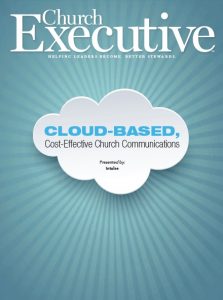 Communication tools church members, guests & seekers appreciate
Communication tools church members, guests & seekers appreciate

Chief Strategy Officer
Intulse
What are some indications that your phone system isn’t up to par for members, guests and seekers?
Goodling: One sign that might go unnoticed is when people just stop calling the church. Because we’re more social media-inclined these days, they’ll send a Facebook message or text, out of convenience — or maybe out of frustration because nobody answers the phone.
While they’ll also leave voice messages, they sometimes get sent to a pastor’s extension or cell phone, only to find the voicemail box is full.
So, a big indication is when someone says, “I don’t even call the church number anymore because …”
What are common issues or annoyances when members, guests & seekers encounter less-than-optimal church phone systems?
Goodling: Again, it can be really frustrating if a pastor’s voicemail box is full, especially if that person isn’t responding to emails.
Also, when one person is responsible for fielding phone calls — and can only handle one call at a time — that’s not the most efficient system, from the caller’s point

of view. They can be put on hold, and during that time, they’re wondering, Are they going to come back to me? Are they trying find out if _____ is available? What’s going on?
They might get sent to a department that has its own extension, but no one is there. So, they end up leaving a message in a general voice mailbox, not feeling like they’ve really connected with anybody.
Or, they might be given access to a directory, but the person they’re trying to reach is missing from it. This can happen if the directory is managed or contracted out to a company other than the current phone system provider. That requires the church to call that company to add someone to the directory — which might or might not seem like time well spent for one simple add.
Have these common irritants influenced the design of your company’s cloud-based phone system?
Goodling: Yes. With a hosted solution, logical extensions can be set up for each person, with their own voice mailboxes. Better yet, these employees can be set up with access installed on their smart phones or laptops. So, that’s one reason why a system that’s mobile is quite valuable.
On the other end, members, guests and seekers will realize the benefit because they can reach whoever they want to reach — and if they don’t, they know their messages are being retrieved by the right people.
Another aspect of the soft phone app that’s well received by staff members is that it goes through the church’s phone system. That means their personal cell phone number isn’t disclosed.
And, when the church wants to add someone new to the system, they just call or email us with that person’s name, email address, and the extension to add, and it’s done.
When designing our system, we frequently asked ourselves one question: How can we help to facilitate good communication? The first live interaction a person has with your church (and might lead them to draw an opinion about you) could be a phone call. If a caller is thinking, I can’t even get hold of somebody at this church to ask a few questions, so they obviously don’t really care about me visiting on Sunday, that could certainly form their opinion.
And let’s face it: like any other business, the church today is about communicating your brand in everything you do.
When a cloud-based phone system integrates with ChMS, how does it contribute to a smoother inbound communication process?
Goodling: When you have an inbound call, a cloud-based phone system uses its management database to try to find a number that matches. If it does, it connects to that record; so, the person receiving the call gets a notification on their screen. They can see who’s calling before they even answer the phone, and they’re prepared. At a glance, they know when the last communication with that caller happened, as well as any pertinent information they might want at their fingertips — even personal situations (if a family member is sick, for instance). During or after the call, notes about the conversation can easily be added to that record.
As far as ChMS integration is concerned, a church just lets us know what ChMS they’re using, and we research how open that software’s API is — in other words, if we can connect to it. If necessary, one of our developers will reach out to the ChMS developer directly. The church doesn’t need to do anything; we do what needs to be done to get the ChMS and phone system connected. Then, when it’s done, the church immediately has that functionality.
— Reporting by Joyce Guzowski & RaeAnn Slaybaugh


